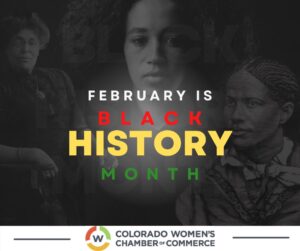Inspiring Equity Through Black History
 By Simone D. Ross
By Simone D. Ross
CEO of the Colorado Women’s Chamber of Commerce
Executive Director of the Colorado Women’s Chamber Foundation
In 1915, a half a century after the abolition of slavery, Carter G. Woodson and Minister Jesse E. Morland founded the Association for the Study of Negro Life and History (ASNLH). This organization was created to research and celebrate the achievements and contributions of Black Americans.
This group celebrated its first ‘Negro History Week’ in February 1926, these celebrations spanned cities across the nation. In the late 1960s, with the Civil Rights Movement gaining traction and heightening awareness of the Black experience, ‘Negro History Week’ evolved into Black History Month. In 1976 President Gerald Ford officially recognized Black History Month, noting the importance of public recognition of the “contributions Black Americans have made in America.”
For this reason, it’s critical that the celebration of Black History Month continues and expands.
In addition to community recognition of Black History Month, it’s important that businesses take bold and deliberate actions in the recognition and celebration of the contributions of Black Americans. Diversity creates dimension, and inclusion is the vehicle organizations activate to effectively achieve workforce equity. Inclusion demands action, operational integration, and leadership. This is an area many organizations have room to grow.
Although the recognition and celebration of Black American’s should be ongoing, initiating Black History Month programming is a sound starting point for businesses as they work to achieve their inclusion and equity goals.
 Organizations can celebrate Black History Month by:
Organizations can celebrate Black History Month by:
Amplifying Black voices
“Pass the mic” opportunities are an impactful way of humanizing the Black experience. This can be accomplished by inviting external Black speakers, inviting existing team members to speak, and creating moments for Black voices to resonate throughout the organization. Creating environments that support psychological safety enables all team members to show up authentically. Passing the mic is not only a way to celebrate Black History Month, but it’s a collaborative strategy that will benefit the organization beyond the month of February.
Providing education, workshops, and learning
Fostering inclusion and equity in the workforce requires exercising new muscles that challenge thinking and support individual growth. Organizations can champion learning by offering EDI (Equity, Diversity, Inclusion) curriculum; sharing books, articles, and podcasts; or engaging in Black History Month trivia as an organization. As businesses work to become more inclusive, it’s important that space is created for team members to be introspective and self-reflective.
Supporting Black-owned businesses
Organizations can take action and demonstrate their commitment to diversity through the implementation of a supplier diversity initiative. Supporting Black-owned businesses highlights the innovation and multifaceted talents of Black founded and operated companies while adding to the longevity and sustainability of Black-owned businesses.
Black history is American history.
When businesses celebrate and recognize the contributions of Black American’s they create space for the acknowledgment of the Black identity in their organizations. Championing inclusivity is actionable, our unique identities must be celebrated and acknowledged. Celebrating Black History Month is a good starting point for businesses as they work to build equitable workforces.
This commitment to equity can’t stop when Black History Month celebrations end. It’s ongoing work and commitment requiring the activation of leadership, culture, and operations.
Share this article:
Other Articles

 By Simone D. Ross
By Simone D. Ross